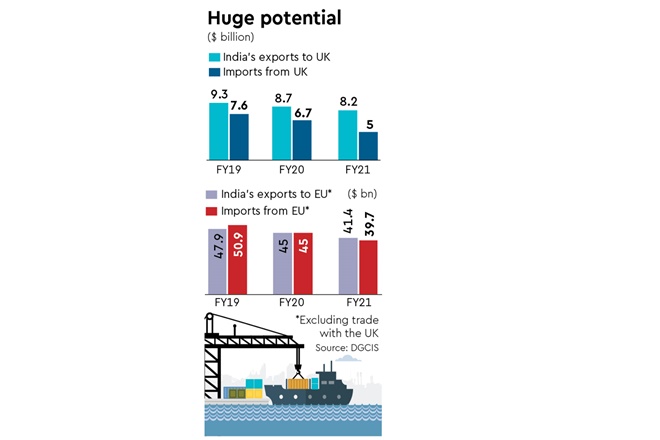As India prepares to launch formal negotiations with the UK and the EU this fiscal for free trade agreements (FTAs), domestic players rush to submit demands for greater market access in hundreds of products, with textiles and garments featuring in the wish list of most stakeholders, sources told FE.
Apex exporters’ body FIEO alone has submitted with the government a list of 240 products — ranging from textiles and pharmaceuticals to engineering goods—in which it wants the UK to cut tariffs. Government officials are drawing up a comprehensive list of items for the talks. This includes electrical machinery, capital goods, auto components, organic chemicals, leather, footwear and toys, among others.
The textile ministry is pitching for duty-free access in textiles and apparels, which made up for 19% and 14% of India’s exports to the UK and the EU, respectively, last fiscal. Textile secretary UP Singh told FE that the inclusion of these products in the planned FTAs will certainly boost India’s exports. However, the government will take a “balanced view” when it starts negotiations, keeping in mind interest of all stakeholders, he added. The EU imposes up to 9.6% duty on Indian textiles and garments, while least developed countries like Bangladesh, and Pakistan get duty-free access.





The Apparel Export Promotion Council and the Confederation of Indian Textile Industry, too, want such products to be part of early negotiations. Similarly, other export organisations seek easier access in dozens of products, relevant to the sectors they represent.
However, some others, mainly in the dairy and farm sector, don’t want the government to commit tariff cuts in these products.
Since its pull-out of the Beijing-dominated RCEP trade negotiations in November 2019, India has been seeking to expedite talks with key economies. But it has made it clear that any trade agreement will have to be “fair” and “balanced”.
While negotiations with the UK could be wrapped up relatively early, those with the EU will be a long-drawn process, given the complexities associated with the 27-member bloc, commerce ministry officials said.
Nevertheless, New Delhi will try to hammer out an early-harvest agreement with London, based on issues where a consensus can be easily forged. This would be followed up with a more comprehensive FTA.
Similarly, as FE has reported, the resumption of negotiations with the EU after a gap of over eight years could see both the parties focussing on “low-hanging fruit” first, before switching on to contentious matters that had hampered talks earlier.
Government officials are also studying the EU’s negotiations with China for an investment agreement and its FTA with Vietnam for meaningful talks.
After 16 rounds of talks between 2007 and 2013, formal talks for the FTA were stuck over stark differences, as the EU insisted that India scrap or slash import duties on sensitive products such as automobiles, alcoholic beverages and cheese, among others. India’s demand included greater access to the EU market for its skilled professionals, which the bloc was reluctant to accede to.
Since 2013, though, the situation has changed dramatically with Brexit, and the attractiveness of the EU as a large market has somewhat eroded. Nevertheless, it still remains an important trade destination.
India’s exports to the EU, excluding the UK, dropped 8% in the wake of the pandemic to $41.4 billion in FY21, representing 14.2% of the country’s total outbound shipment of goods. Similarly, its exports to the UK declined 7% to $8.2 billion last fiscal.
India’s major exports to the EU in FY21 were textiles and garments ($5.6 billion), organic chemicals ($4.2 billion), iron & steel and related products ($3.9 billion), mineral fuels, etc ($2.9 billion) and pharmaceuticals ($1.9 billion). Its exports to the UK included textiles and garments ($1.6 billion), gems and jewellery ($744 million), electrical machinery ($565 million), pharmaceuticals ($618 million) and auto ($244 million).
Experts, too, have suggested that in their negotiations, both the sides need to work on less controversial issues first. Subsequently, innovative solutions need to be firmed up to break the log jam in more contentious matters.
For instance, Arpita Mukherjee — professor at Icrier who specialises in trade and investment—has proposed a threshold price for alcohol for tariff liberalisation, as was done by Japan for Australian wines under the RCEP.



















